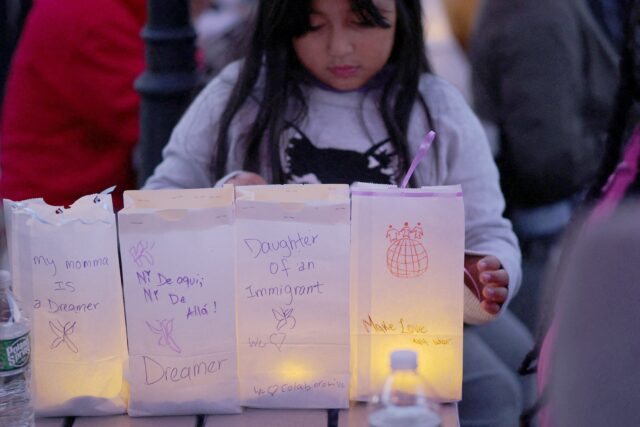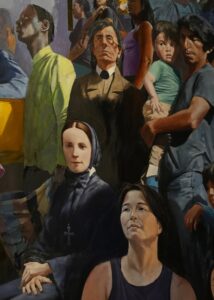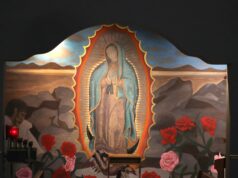
ROCHESTER, N.Y. — The Catholic bishops of New York state are calling on the state’s faithful to stand in solidarity with immigrants and refugees.
In a joint statement released Nov. 13, the bishops pointed to church teachings related to immigrants and encouraged the state’s Catholics to sign a pledge demonstrating their commitment to prayer and energy on behalf of migrants. The Cabrini Pledge, which is named after St. Frances Xavier Cabrini, was introduced by the U.S. Conference of Catholic Bishops in September.
“The Bishops of the United States have called on Catholics in all walks of life to stand in solidarity with immigrants and refugees by signing The Cabrini Pledge, an invitation to be Keepers of Hope,” New York’s bishops wrote.
The bilingual initiative invites the faithful to affirm the dignity of every person, commit to prayer and civic dialogue, and accompany migrants and refugees with compassion.
“We encourage New York Catholics to sign their pledge,” the bishops continued. “By doing so, you will follow in the footsteps of our beloved Mother Cabrini in acknowledging our duty to welcome, to protect, to promote, and to integrate immigrants in accordance with the guidance proclaimed by Sacred Scripture and the Magisterium of the Church.”
St. Frances Xavier Cabrini is among the immigrants celebrated in a 25-foot mural unveiled at St. Patrick’s Cathedral in September. An Italian immigrant, she overcame anti-Italian prejudice and established numerous charitable institutions and schools serving immigrants.
Her inclusion in the mural is a reminder of the church’s longstanding care and concern for immigrants, the bishops noted, adding that the mural itself highlights New York’s long history of welcoming immigrants.
“New York was and is a land of immigrants whose contributions have enriched and transformed, indeed built, our society,” the bishops wrote. “Contemplating this magnificent mural at a moment when our nation considers again the plight of the immigrant, we recall that Christian charity, as lived so powerfully by Mother Cabrini, demands we welcome the stranger and treat every individual with respect and dignity.”
Catholics’ call to welcome the stranger stems from the Bible, the bishops noted in their statement, which is titled “For You Too Were Once Aliens.”
The statement quotes Leviticus 19:33-34, which stipulates, “When an alien resides with you in your land, do not mistreat such a one. You shall treat the alien who resides with you no differently than the natives born among you; you shall love the alien as yourself; for you too were once aliens in the land of Egypt.”
The bishops added that the Catechism of the Catholic Church reinforces this call, citing the obligation of prosperous nations to welcome foreigners in search of “security and the means of livelihood” that they cannot find in their countries of origin.
The catechism also notes immigrants’ obligation to obey the laws of the nations that receive them, the bishops said.

Just a day before the New York bishops released their joint statement, the U.S. bishops as a body — gathered for their fall plenary assembly in Baltimore — overwhelmingly approved a special pastoral message on immigration “to raise our voices in defense of God-given human dignity.” They amended the message on the floor to clearly condemn “indiscriminate mass deportation” alongside their call to end “dehumanizing rhetoric and violence, whether directed at immigrants or at law enforcement.”
The bishops also urged “meaningful reform” of U.S. immigration laws and procedures in order to balance “human dignity and national security,” as Catholic teaching specifies.
The New York bishops in their statement reference Pope Leo XIV’s Oct. 4 apostolic exhortation, “Dilexi Te” (“I Have Loved You”), which says the church “knows that her proclamation of the Gospel is credible only when it is translated into gestures of closeness and welcome. And she knows that in every rejected migrant, it is Christ himself who knocks at the door of the community.”
In recent years, many of those knocking at the United States’ door have come from war-torn countries or fled poverty, authoritarian governments or drug cartels, according to the state’s bishops. And while they noted that the majority of these immigrants are good people, the bishops have acknowledged that some have exploited the system or committed crimes, and that these individuals should face the appropriate criminal and civil penalties, including deportation.
“At the same time, general enforcement of the immigration laws must be carried out in a humane manner that does not target the hard-working and law-abiding; that does not permit the wanton and unnecessary separation of families; and that does not rely on campaigns of fear that cripple whole communities,” the bishops wrote.
New York’s bishops wrote that they do not support the sweeping revocation of Temporary Protected Status granted to many migrants, nor do they condone violence against immigration and law enforcement agencies.
The government has a duty to secure its borders and ensure that immigrants enter lawfully, the bishops said, noting that they join bishops throughout the nation in calling for immigration reform that does so while offering avenues for forgiveness for those who entered without legal status but “have proven their contributions and loyalty to our country over a period of time.”
The bishops acknowledged that immigration reform involves complex questions, yet said the most important thing to remember is Christ’s commandment to love our neighbor as ourselves.
“All other imperatives are subject to this law of charity, and it is concerned neither with legal status nor country of origin. As individuals and as a society, we are bound to follow this supreme command and to make all of our actions consistent with it,” the bishops wrote.








